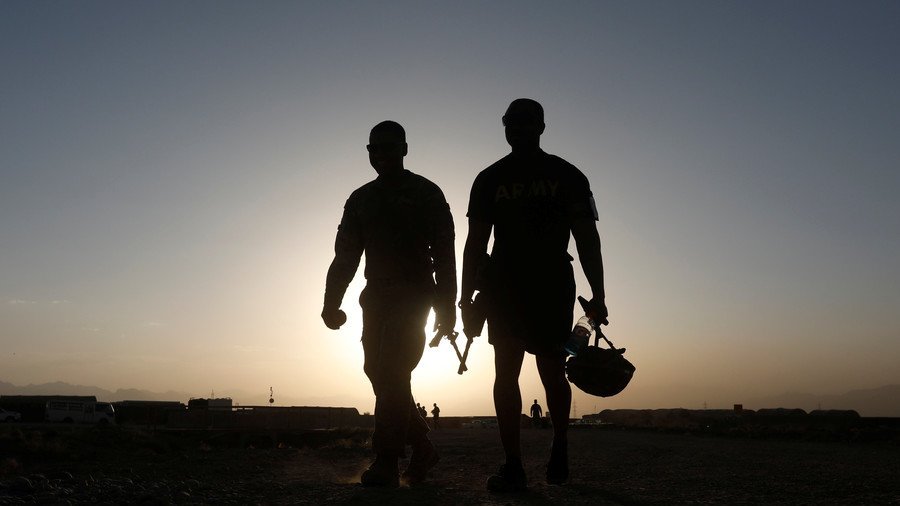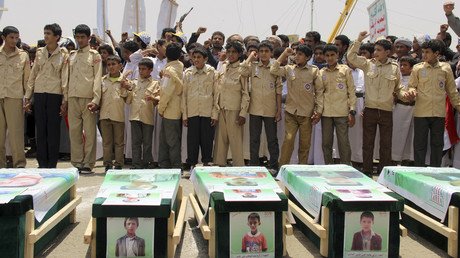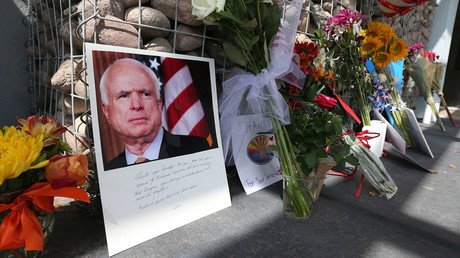Blackwater founder seeks to privatize Afghan war despite mercs getting butt kicked in Yemen

Upon departing as commander of US Forces Afghanistan, Gen. John Nicholson recently said that America's military strategy, revised a year ago under the Trump administration, is working.
At the same time, Erik Prince, founder of Blackwater [currently known as Academi], apparently doesn't share that view and intends to renew his offer to his friend, President Donald Trump, to replace US military forces with Private Military Contractors, or PMCs.
Despite the differences, and any similarities, the military solutions for peace in Afghanistan offered by Nicholson and Prince are both delusional.
In saying that the latest US military strategy is working, Nicholson believes the current military solution is having the effect of "advancing us towards reconciliation" with the Afghan Taliban.
"I believe the South Asia Strategy is the right approach," Nicholson said during a brief teleconference with reporters at the Pentagon before the link was disrupted.
"And now we see that approach delivering progress on reconciliation that we had not seen previously. And I think that was because we clearly communicated to the enemy they could not wait us out."
While Nicholson believes that the military strategy of using troops to train and assist the Afghan military is going to work, he failed to point out that the US at one point had some 100,000 combat troops there and still couldn't defeat the Taliban. Today, there are no more than 10,000 soldiers who are not in a combat role but are there to train the Afghan military.
Nicholson's assessment comes despite the fact that the Taliban today has control over more than 50 percent of the country and has little trouble launching attacks on government buildings in the Afghan capital Kabul.
When the US attacked Afghanistan in October 2001 because the Taliban, in control of the country at the time, refused to turn over Osama bin Laden who launched a terrorist attack on the US the previous month, the Taliban were virtually eliminated from the country.
Only after the US diverted its attention to attacking Iraq in March 2003, the Taliban began to return to the country from neighboring Pakistan which not only harbored the insurgent group but actually created it under the auspices of its own military and intelligence, the Inter-Services Intelligence agency.
Even though the US war in Afghanistan is in its 17th year, Trump is sticking with his strategy that he implemented a year ago although privately he is expressing increasing frustration with the results.
Prince, whose sister is Education Secretary Betsy DeVos, believes it's time to renew his offer of PMCs and privatize the war in Afghanistan.
"I know he's frustrated," Prince said referring to the Trump's outlook on the progress of defeating the Taliban militarily in Afghanistan. "He gave the Pentagon what they wanted…And they haven't delivered."
Prince said that Trump's advisers who oppose his plan are portraying "as rosy a picture as they can" of the fighting on the ground and that "peace is around the corner" in efforts to enter discussions with the Taliban. They "over-emphasize the fluff and flare of these so-called peace talks."
Prince admits he hasn't spoken yet to the president to renew the request. While Defense Secretary James Mattis and Secretary of State Mike Pompeo oppose Prince's plan, the current military strategy may not show results until at least next summer, if then, something which may prompt Trump to consider Prince's offer.
However, National Security Advisor John Bolton has been strangely silent on Prince's proposal. In coming days, Prince said he intended to launch a media campaign to convince the president to favorably consider his plan of action.
Prince's notion that his PMCs will get the job done where the military couldn't is equally unrealistic. Prince's Blackwater PMCs have been operating out of the United Arab Emirates since 2011. His mercenaries hail from such countries as Australia, Chile, Columbia, El Salvador, Panama and South Africa.
They originally were hired to provide training and defense inside the UAE since its own forces are incapable of doing so. In 2012, the mercenaries, nicknamed mercs, were deployed to fight pirates off the coast of Somalia. Then in 2015, reports began to surface that Prince's mercs were launching attacks inside Yemen.
It was part of an effort by Saudi Arabia and the UAE to undertake a more aggressive military strategy in the region. This more aggressive effort is part of an initiative by Sheikh Mohammed bin Zayed bin Sultan Al-Nahyan, nicknamed MbZ, who is the Crown Prince of Abu Dhabi and deputy supreme commander of the UAE's armed forces. He united with the Saudis, particularly its current crown prince and defense minister, Mohammed bins Salman Al Saud, to undertake this military strategy.
While it was thought at the time that Prince no longer was dealing with the emirates, more recent reports suggest otherwise. In 2016, Yemeni Army spokesman Brig. Gen. Sharaf Ghalib Luqman pointed out hat the Saudi-led coalition was hiring contractors, among them were 400 from the US private security firm Blackwater.
"Erik Prince is back," said David Isenberg, a researcher and writer on US military and international security issues, in a 2017 article.
"He's not only pitching colonial capitalism in DC, but huckstering ex-SF led armies of sepoys to wrest Afghanistan, Yemen, Libya and perhaps, if he is ever able to influence likeminded hawks in the Trump administration, even Iran back from the infidels," he said.
In Yemen, the war effort continues with logistical and intelligence support from the US. Yet, it hasn't been going so well and has created a major humanitarian disaster for all the civilians the militaries of the Saudis and UAE have killed.
For the PMCs, the effort similarly has been a disaster, since their forces have been dealt numerous serious defeats in Yemen.
It raises the question of what the PMCs can do in Afghanistan if they are getting their butts kicked now in Yemen?
Unstated is the fact that despite the US military presence in Afghanistan, there also are PMCs working with them. One intelligence official told me that the ratio of PMCs to US soldiers in Afghanistan is better than five to one.
If that is the case, and PMCs already are fighting at some five times the strength of the US forces already in Afghanistan, what convincing information can Prince convey to Trump to get him to substitute his PMCs for the US military?
Trump's frustration suggests that inevitably he will need to face the fact that any military solution to halt the war in Afghanistan isn't going to work and that it is long past time to get the countries of the region together, with the US present, to come up with a lasting political solution.
Think your friends would be interested? Share this story!
The statements, views and opinions expressed in this column are solely those of the author and do not necessarily represent those of RT.

















